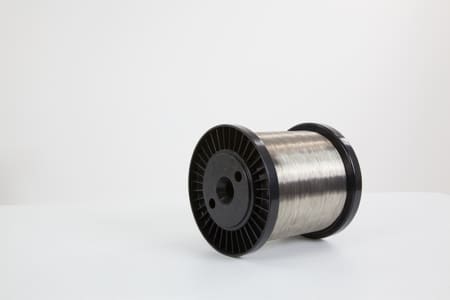There are many differences between stranded wire and solid wire, the two most popular types of wiring.
In this post, we will discuss their pros and cons, and when to use stranded wire vs solid wire, to help you decide which type is best for your needs.
Thermocouple and resistance wires can all be manufactured as solid or stranded wires. In the case of stranded resistance wires, the individual strands are carefully manufactured by stranded wire suppliers to ensure the finished resistance is within the specification.
Without further ado, let’s dive into the difference between solid and stranded wire!
Stranded Wire vs Solid Wire
By Stephen Holt, Technical Manager since 1996
Advantages of Stranded Wire:
Before we discuss its advantages, we should point out that there are many different types of ‘stranded wire’, from plain, bunched wire to super-flexible, multilayer, concentric rope strands.
- The main advantage of stranded wire is that it is much more flexible than solid wire. Twisting together a number of finer wires reduces the strain on each one when the conductor is flexed making it less likely for the wire to break.
- The spiralling also increases the conductor’s ability to withstand thermal expansion and contraction strains.
Disadvantages of Stranded Wire:
- More expensive: Stranded wire costs more than solid wire because it is more complex to manufacture. You have to make multiple, smaller wires, which are then twisted together, sometimes passing through the laying up machines several times (in the case of rope stranding for instance) to create the finished product.
- Stranded wires can be more difficult to terminate. When removing the insulation, you have to be careful not to break off the ends of any of the individual wires and ensure they are all fitted into the terminal. You can use a ferrule to hold the wires together, but need to be careful if the conductor is a thermocouple wire. The ferrule would need to be made from the thermocouple material in order not to introduce another thermocouple junction into the system!
- Compared to solid wire, stranded wires have a greater diameter. The solid or stranded conductors are specified to maintain the cross-sectional area of metal so that the resistance is the same and they carry the same current, but a stranded wire cross-section will include air gaps between the wires, increasing the overall size.
- Finish: a stranded wire will not be as smooth as a solid wire. This does not matter if you are covering it in a thick wall insulation like PVC, but some fluoropolymer insulations are only 0.3mm thick and need to go over a smooth surface for them not to crack. Stranded conductors for thin wall insulations have to be made up of thin individual wires, laid up concentrically to provide a smooth surface.
Advantages of Solid Wire:
- Solid wire is easier to terminate as the insulation can be removed without risk of breaking the fine wires in a stranded construction. It is also significantly cheaper.
- Solid wires are often easier to fit in electrical panels. Although they are stiffer to bend, once they are, they stay in place and can be slotted into the terminal blocks in neat rows.
Disadvantages of Solid Wire:
- Poor flexibility: While solid wire is less expensive to manufacture than stranded wire, it cannot be used in environments where the cable has to be flexed. The conductor and insulation will break if they are repeatedly moved. Consequently, solid wires are only suitable for fixed installation situations.
Stranded Wire vs Solid Wire: Which Should You Choose?
If you need help determining the right wire construction for your application, contact us and our technical experts can help you decide which is the most appropriate for your project.


